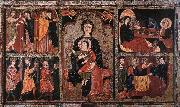La Peinture à l'huile en gros de Chine & Encadre |
|||||||||||

|
|||||||||||
|
|
|
||||||||||||||
|
|
||||||||||||||
|
||||||||||||||
|
|
||||||||||||||
| unknow artist
Scenes_from_the_Life_of_Jesus 105 x 175 cm Museu Nacional d'Art de Catalunya, Barcelona The picture represents one of the most characteristic themes of Spanish Romanesque painting: the Virgin with scenes from the life of Jesus on either side of the central group; it was painted by the Master of Avi? the master responsible for the altar in the church of Avi? These scenes are well known even today to those who appreciate early European painting: represented from left to right are the Annunciation, then the Visitation (Mary's visit to Elizabeth, the mother of St John the Baptist,', ', ', ', ', ', ', '); the upper right scene depicts the ox and the ass bending over the Child in the manger; the bottom left scene shows the three Magi guided by the star, while the lower right scene depicts Jesus being presented in the temple. The central figure of the Child on Mary's knee is not the small adult seen in earlier paintings: the artist has portrayed a lively child who seems to be leaping out of the architectonic frame, as if to acknowledge the welcoming gesture of Melchior. This panel reveals a much more 'modern' approach than that of the Master of Seo de Urgell who executed the rigid representation of the twelve apostles in Christ and the Twelve Apostles. The colours are brighter, the contrasts sharper, the figures more animated and the drapery less schematic; but because of the emphatic red of the cheeks, the lack of perspective and the stereotyped representation of the eyes, this picture is also a characteristic example of Romanesque painting. , UNKNOWN MASTER, Spanish , Scenes from the Life of Jesus , 1151-1200 , Spanish , painting , religious 105 x 175 cm Museu Nacional d'Art de Catalunya, Barcelona The picture represents one of the most characteristic themes of Spanish Romanesque painting: the Virgin with scenes from the life of Jesus on either side of the central group; it was painted by the Master of Avi? the master responsible for the altar in the church of Avi? These scenes are well known even today to those who appreciate early European painting: represented from left to right are the Annunciation, then the Visitation (Mary's visit to Elizabeth, the mother of St John the Baptist,', ', ', ', ', ', ', '); the upper right scene depicts the ox and the ass bending over the Child in the manger; the bottom left scene shows the three Magi guided by the star, while the lower right scene depicts Jesus being presented in the temple. The central figure of the Child on Mary's knee is not the small adult seen in earlier paintings: the artist has portrayed a lively child who seems to be leaping out of the architectonic frame, as if to acknowledge the welcoming gesture of Melchior. This panel reveals a much more 'modern' approach than that of the Master of Seo de Urgell who executed the rigid representation of the twelve apostles in Christ and the Twelve Apostles. The colours are brighter, the contrasts sharper, the figures more animated and the drapery less schematic; but because of the emphatic red of the cheeks, the lack of perspective and the stereotyped representation of the eyes, this picture is also a characteristic example of Romanesque painting. , UNKNOWN MASTER, Spanish , Scenes from the Life of Jesus , 1151-1200 , Spanish , painting , religious |
||||||||||||||
|
Related Paintings to unknow artist :. |
||||||||||||||
|
|
||||||||||||||
|
|
||||||||||||||
|
CONTACTER DES Etats-Unis |







